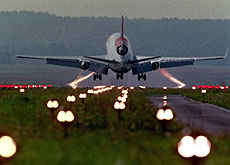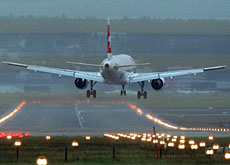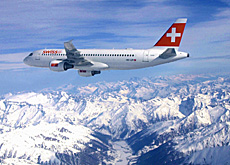Parliament scuppers aviation deal with Germany

An aviation deal between Switzerland and Germany has collapsed after parliament refused to ratify it.
Berlin reacted swiftly, announcing that it was imposing new limits on flights over southern German airspace.
Skyguide, Switzerland’s air traffic control agency, has warned that the decision will have an impact on the country’s aviation industry.
On Tuesday, the Senate threw out the controversial agreement which limits flights into Switzerland’s main airport at Zurich. The House of Representatives had already refused to ratify the accord.
The decision sets the stage for a diplomatic row with Berlin, which has threatened to impose tougher flight restrictions over southern Germany and take over responsibility for air traffic control.
Parliament’s decision will have both operational and financial consequences for Switzerland’s aviation industry, according to Skyguide spokesman Patrick Herr.
“Rejecting the agreement means Zurich will have less capacity and there will be more delays if Germany takes over control of the whole of its airspace,” he told swissinfo.
“With the restructuring of airspace in southern Germany, we stand to lose up to SFr40 million every year,” he added.
Rapid response
Berlin’s response to Tuesday’s decision was immediate. It announced it was widening the ban on night-time flights over southern Germany.
It also said it was reducing the total number of flights allowed annually to 110,000. The German transport ministry said the new measures would come into effect by mid-April at the latest.
Officials said this figure would be cut to 80,000 a year later.
Herr maintains that the failure to ratify the accord will also have an impact on Switzerland’s other major airports – most notably Geneva.
He says if Germany takes control of airspace in Baden Württemberg it will manage one of Europe’s major crossing points. Airlines would then have to pay the German authorities rather than Skyguide.
Herr warned that taxes on airlines using Swiss airspace would have to be increased to cover the expected shortfall.
“If we need to raise taxes we will need to do it quite substantially,” he said.
“That will make civil aviation in Switzerland far less attractive and much more expensive for all airlines,” he added. “The impact will not only be felt in Zurich, but also Geneva and all the airports we serve.”
Welcome decision
The Swiss Business Federation (economiesuisse), the national carrier Swiss, the Zurich cantonal government and the operators of Zurich airport have all praised the Swiss parliament’s decision.
They opposed the deal from the outset, saying it discriminated against Switzerland and did not conform to European regulations.
“The deal is Germany’s way of imposing stricter regulations on Zurich airport than it would ever imagine trying to introduce on any of its own domestic airports such as Frankfurt, Munich or Berlin,” Peter Hutzli, an executive board member of economiesuisse, told swissinfo.
“Southern Germany has a relatively low population density level and the planes landing in Zurich still fly quite high over Baden Württemberg.
“The agreement did not take into account the advantages of modern aircraft which are much quieter. Generally it was not in the best interests of Switzerland.”
In a statement, Swiss said it hoped negotiations for an aviation deal at a political level could start again from scratch. Zurich airport said it remained confident that no extra flight restrictions would be introduced in the short term.
Night-time ban
Switzerland’s transport minister, Moritz Leuenberger, negotiated the deal in October 2001 with his then German counterpart, Kurt Bodewig.
Both sides agreed to cut by a third the number of flights permitted to fly over Baden Württemberg in southern Germany before landing in Zurich – less than 20 kilometres from the German border.
There was also a ban on night and weekend flights.
Although the agreement was heralded as a way of reducing noise pollution in southern Germany, Leuenberger came under fire at home for giving too much away.
While Hutzli is confident that Switzerland will be able to renegotiate a more favourable treaty with Germany, Herr remains sceptical whether anything can be gained from rejecting the current agreement.
“Limiting air traffic controls to national borders is against the spirit of the policy of the single European sky,” he said.
“Not only that – it’s also total nonsense.”
swissinfo, Jonathan Summerton
The accord was agreed in October 2001 by Switzerland’s transport minister, Moritz Leuenberger, and his German counterpart, Kurt Bodewig.
The agreement cut the number of flights over southern Germany into Zurich from 150,000 to 100,000 a year.
Berlin threatened to take over control of southern German airspace and limit the number of flights to 80,000 a year if Switzerland refused to ratify the agreement.

In compliance with the JTI standards
More: SWI swissinfo.ch certified by the Journalism Trust Initiative


You can find an overview of ongoing debates with our journalists here. Please join us!
If you want to start a conversation about a topic raised in this article or want to report factual errors, email us at english@swissinfo.ch.